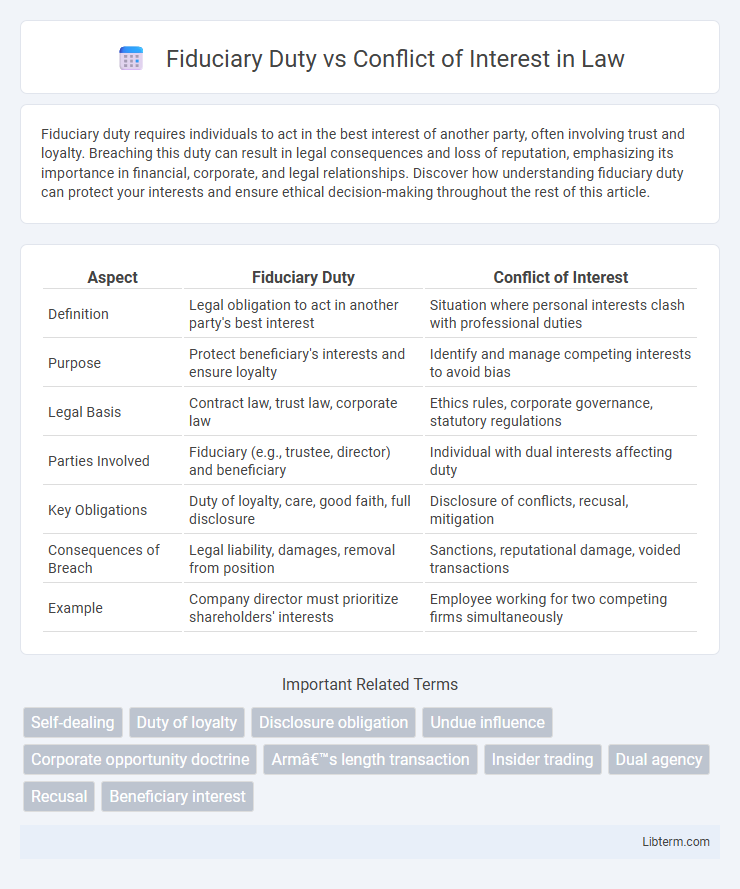Fiduciary duty requires individuals to act in the best interest of another party, often involving trust and loyalty. Breaching this duty can result in legal consequences and loss of reputation, emphasizing its importance in financial, corporate, and legal relationships. Discover how understanding fiduciary duty can protect your interests and ensure ethical decision-making throughout the rest of this article.
Table of Comparison
| Aspect | Fiduciary Duty | Conflict of Interest |
|---|---|---|
| Definition | Legal obligation to act in another party's best interest | Situation where personal interests clash with professional duties |
| Purpose | Protect beneficiary's interests and ensure loyalty | Identify and manage competing interests to avoid bias |
| Legal Basis | Contract law, trust law, corporate law | Ethics rules, corporate governance, statutory regulations |
| Parties Involved | Fiduciary (e.g., trustee, director) and beneficiary | Individual with dual interests affecting duty |
| Key Obligations | Duty of loyalty, care, good faith, full disclosure | Disclosure of conflicts, recusal, mitigation |
| Consequences of Breach | Legal liability, damages, removal from position | Sanctions, reputational damage, voided transactions |
| Example | Company director must prioritize shareholders' interests | Employee working for two competing firms simultaneously |
Understanding Fiduciary Duty
Fiduciary duty is a legal obligation requiring an individual to act in the best interest of another party, typically involving loyalty, care, and good faith. This duty mandates prioritizing the beneficiary's interests above personal gain, ensuring decisions and actions align with their welfare. Recognizing fiduciary duty is critical for preventing conflicts of interest that may compromise trust and ethical responsibilities.
Defining Conflict of Interest
A conflict of interest occurs when an individual's personal interests potentially interfere with their ability to act in the best interests of another party, such as a client or employer. This situation compromises fiduciary duty, which legally obligates the individual to prioritize the beneficiary's interests above all else. Identifying and managing conflicts of interest are critical to maintaining trust and upholding ethical standards in fiduciary relationships.
Core Principles of Fiduciary Duty
Fiduciary duty mandates loyalty, care, and good faith, requiring fiduciaries to prioritize the beneficiary's interests above their own, ensuring trust and transparency. Conflicts of interest arise when personal or financial interests potentially interfere with the fiduciary's obligation to act solely for the beneficiary's benefit. Core principles emphasize avoiding self-dealing, full disclosure, and maintaining loyalty to uphold fiduciary responsibility.
Types of Conflicts of Interest
Types of conflicts of interest include self-dealing, where fiduciaries prioritize personal gain over client interests, and competing fiduciary duties, such as when serving multiple clients with opposing goals. Another common type is the misuse of confidential information for personal benefit or to the detriment of the principal. Recognizing and managing these conflicts is essential to uphold fiduciary duty and maintain trust in professional relationships.
Legal Implications of Fiduciary Breaches
Fiduciary duty mandates that individuals act in the best interests of their clients or beneficiaries, prioritizing loyalty and care above personal gains. Breaches of fiduciary duty, especially through conflicts of interest, can lead to severe legal consequences including litigation, financial penalties, and potential disqualification from professional roles. Courts often impose remedies such as restitution, disgorgement of profits, and punitive damages to address fiduciary breaches and uphold trust in legal and financial relationships.
Fiduciary Duty in Corporate Governance
Fiduciary duty in corporate governance mandates that directors and officers act in the best interests of the corporation and its shareholders, prioritizing loyalty and care above personal gain. This legal obligation requires transparent decision-making, avoidance of self-dealing, and protection of corporate assets to maintain trust and ensure sustainable value creation. Breaches of fiduciary duty, often involving conflicts of interest, can lead to legal consequences and damage to shareholder confidence.
How Conflicts of Interest Arise
Conflicts of interest arise when an individual's personal interests potentially interfere with their fiduciary duty to act in the best interest of another party, such as shareholders or clients. These conflicts commonly occur in corporate governance, financial advisory roles, and legal representations where decision-makers face competing loyalties between personal gain and professional responsibilities. Identifying and managing these conflicts is crucial to maintain trust, transparency, and compliance with legal and ethical standards.
Preventing and Managing Conflicts of Interest
Preventing and managing conflicts of interest requires strict adherence to fiduciary duty principles that mandate acting in the best interest of clients or stakeholders with utmost loyalty and transparency. Implementing robust policies such as disclosure requirements, regular audits, and conflict-of-interest training helps identify and mitigate potential biases that could compromise decision-making integrity. Effective management includes recusal from conflicting decisions and establishing independent oversight to maintain trust and uphold ethical standards in fiduciary relationships.
Real-World Examples: Fiduciary Duty vs Conflict of Interest
Fiduciary duty requires individuals, such as corporate board members or financial advisors, to act in the best interest of their clients or stakeholders, as seen when a trustee manages a trust solely for the beneficiaries' benefit. A conflict of interest arises when these fiduciaries prioritize personal gain over their duty, exemplified by a financial advisor recommending investments from which they receive undisclosed commissions. Real-world breaches include cases like the Enron scandal, where executives prioritized personal profit, violating their fiduciary obligations and causing significant investor losses.
Best Practices for Upholding Fiduciary Responsibility
Upholding fiduciary responsibility requires strict adherence to transparency, where all potential conflicts of interest are promptly disclosed to relevant stakeholders. Implementing comprehensive policies that mandate regular conflict of interest assessments and enforce accountability measures ensures fiduciaries act solely in the best interests of clients or beneficiaries. Regular training on ethical standards and legal obligations further strengthens commitment to fiduciary duties and mitigates risks associated with conflicts of interest.
Fiduciary Duty Infographic

 libterm.com
libterm.com